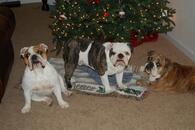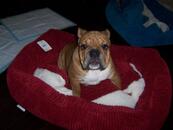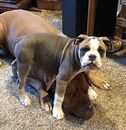B
Baxter Tiberius
Guest
One of the reasons I brought Bax to the vet the other day was actually because he continues to stop breathing while he sleeps.
Today for the first time, I didnt wake him when it happened. I waited, and counted how long he went without air.
25 seconds. An entire 25 seconds without a breath.
He will heave and you'll see his ribs trying to expand, but there is no airflow. Its really upsetting for me because I know its damaging his brain, kicking his blood pressure sky high, which will cause heart problems eventually.
I mentioned this problem to no less than three vets the other day. He had two appointments, and my friend is a vet.
All three looked at me cross eyed. They had nothing to contribute to the conversation. I wanted to discuss the possible options for sleep apnea, as well as complications that arise from it, but they were dumbfounded. Fascinating.
Someone here mentioned that there's a surgery for this issue. Baxters Trachea is miniscule. In the X ray I saw, it was less than pencil thin. No wonder he can't get air.
Is there a tracheal surgery for dogs to widen it? His nose opening is fine.
Today for the first time, I didnt wake him when it happened. I waited, and counted how long he went without air.
25 seconds. An entire 25 seconds without a breath.
He will heave and you'll see his ribs trying to expand, but there is no airflow. Its really upsetting for me because I know its damaging his brain, kicking his blood pressure sky high, which will cause heart problems eventually.
I mentioned this problem to no less than three vets the other day. He had two appointments, and my friend is a vet.
All three looked at me cross eyed. They had nothing to contribute to the conversation. I wanted to discuss the possible options for sleep apnea, as well as complications that arise from it, but they were dumbfounded. Fascinating.
Someone here mentioned that there's a surgery for this issue. Baxters Trachea is miniscule. In the X ray I saw, it was less than pencil thin. No wonder he can't get air.
Is there a tracheal surgery for dogs to widen it? His nose opening is fine.




